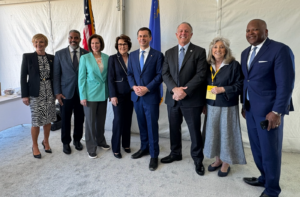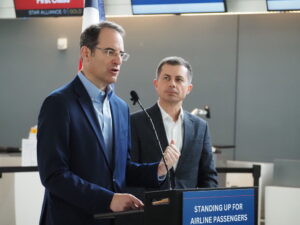The future trajectory of revenue needed to maintain Southern Nevada roadways is “not a good one” as the potential expiration of a component of the gas tax could lead to funding shortfalls, Clark County Commissioners were told Tuesday.
M.J. Maynard, the CEO with the Regional Transportation Commission of Southern Nevada, gave commissioners an overview of how tax revenue from various sources has helped fund transit projects.
But the fuel revenue index program, which allows the county to index gas taxes to the rate of inflation, is set to expire at the end of 2026. The RTC projected it could see a $156.3 million deficit starting in 2028.
Unlike sales taxes, which are a percentage of the purchase price, the gas tax is a set amount – 23 cents per gallon – whatever the price of gas. Under the fuel indexing, the tax has been allowed to increase in amounts related to the inflation rate of street and roadway construction costs.
State law allowed the county to increase the tax if approved by a majority of voters via a general election ballot measure. Clark County voters did so with nearly 60% of voters in 2016. The tax indexing could go back before voters in 2026.
“The biggest takeaway is we have a structural problem with how we fund both roadways and transit,” Maynard said.
Maynard said Southern Nevada “wouldn’t be where we are today as far as infrastructure projects,” if the fuel revenue index hadn’t been approved.
Assembly Bill 359, which was introduced during the 2023 legislative session, would have enabled Clark County, by a two-thirds majority of the county commission, to continue inflation-adjusted increases to the gas tax beyond the first day of 2027, when that authority is scheduled to expire under current law.
The bill passed with bipartisan support but was vetoed by Gov. Joe Lombardo.
In his veto message, Lombardo wrote that while the “arguments in favor of fuel revenue indexing are compelling, a decision on this issue, which impacts household budgets every day, is most appropriately rendered by the voters.”
“The current, voter-authorized fuel revenue indexing does not expire until 2026, leaving sufficient time for further consideration of solutions that more equitably allocate responsibility for roadway improvements among all users,” he wrote.
With the 2025 legislative session less than a year away, commissioners suggested state lawmakers once again pass legislation empowering the county to index the tax and ensure the RTC has a plan to address funding challenges.
“Hopefully, we can all focus on making sure that he doesn’t veto it next time,” said Commissioner Tick Segerblom. “We cannot let transit die.”
In addition to maintaining the roadways, Maynard said revenue from the gas tax has gone to fund more than 250 transit projects. There are still more the commission hasn’t been able to complete because of lack of funds.
“Your staff has forwarded to us a list of about $2 billion worth of projects that do not have identified funding,” Maynard told commissioners.
The Infrastructure Investment and Job Act, commonly referred to as the bipartisan infrastructure law, passed in 2021 has allowed for some transportation projects to be funded.
Those are usually projects that only need one-shot infusion of money rather than a sustainable funding source.
Most recently, Las Vegas was awarded nearly $150 million in federal funding for the Maryland Parkway Bus Rapid Transit project, a 13-mile bus route between the Harry Reid International Airport and the Las Vegas Medical District west of downtown..
“We can’t rely on federal funding for all that we do,” said Commissioner Justin Jones. “That project and every other project that we have been able to obtain federal funding for requires matches. We can’t make those matches unless we have long term dedicated funding sources for the transit side and the roadway funding side.”
The lack of stable funding source, Maynard said, has prevented the agency from going after more money allocated from the bipartisan infrastructure law.
“We didn’t go after many grants because we didn’t have that long term sustainable match,” Maynard said. “If we would have applied the answer would have been ‘no.’”
Our stories may be republished online or in print under Creative Commons license CC BY-NC-ND 4.0. We ask that you edit only for style or to shorten, provide proper attribution and link to our website. AP and Getty images may not be republished. Please see our republishing guidelines for use of any other photos and graphics.




